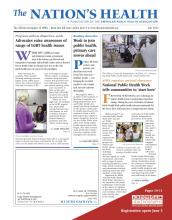Seniors who increase the intensity of their physical activity, such as walking, can reduce their risk of heart attack and heart failure, according to a recent study.
Walking faster and longer led to better heart health in seniors age 65 and older, according to a study published online May 5 in the journal Circulation.
“Modest physical activity, such as the distance and pace of walking, is important for the heart’s electrical well-being of older adults,” said study lead author Luísa Soares-Miranda, PhD, a researcher at the Harvard School of Public Health and the Faculty of Sport, University of Porto Research Center in Physical Activity, Health and Leisure in Portugal.
Researchers monitored the physical activity and heart rates of 985 seniors over five years in the Cardiovascular Health Study, a National Heart, Lung and Blood Institute-sponsored study.
Participants wore 24-hour heart monitors and researchers recorded the seniors’ heart rates, as well as walking pace and distances in follow-up visits, the study said. Seniors were also evaluated on how often and long they performed activities, such as walking, gardening and bicycling.
Seniors who walked longer distances and picked up their paces had a higher heart rate variability — the variations in the time between one heart beat and the next — than those who slowed down or never changed their walking habits, the study said. The higher the variations in the time between one heart beat and the next, the healthier a senior was, the study said. For example, seniors who increased their walking pace had an average of nearly 118 milliseconds of variations in the time between beats, compared to 113.6 milliseconds in seniors who maintained the same pace and nearly 110 in those who decreased their paces. Seniors who walked longer and faster also had less erratic heartbeats, the study said.
Soares-Miranda said if seniors feel comfortable with their usual physical activity, they should not slow down. If anything, seniors should increase the intensity and length of the activity, she said.
“Our results suggest not only that regular physical activity later in life is beneficial, but also that certain beneficial changes that occur may be reduced when physical activity is reduced,” Soares-Miranda told The Nation’s Health. “This supports the need to maintain modest physical activity throughout the aging process.”
For more information, visit http://circ.ahajournals.org/content/early/2014/04/15/CIRCULATIONAHA.113.005361.abstract.
- Copyright The Nation’s Health, American Public Health Association









